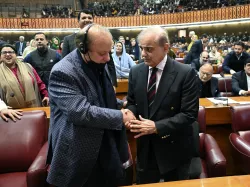Pakistan's PM-elect Shehbaz Sharif to take oath of office today; Army chief, brother Nawaz to attend event
President Arif Alvi will administer the oath to Shehbaz in a ceremony at the President's House at 3 pm. Army Chief Gen Asim Munir, caretaker Prime Minister Anwarul Haq Kakar, Chief Ministers and governors of all provinces will attend the ceremony.

Islamabad: Pakistan Prime Minister-elect Shehbaz Sharif will take the oath of office for the second time on Monday, days after his Pakistan Muslim League-Nawaz and the Pakistan Peoples Party agreed on a power-sharing deal to form a coalition government. Shehbaz, 72, earlier served as prime minister of a coalition government from April 2022 to August 2023 before Parliament was dissolved to hold general elections last month.
President Arif Alvi will administer the oath to Shehbaz in a ceremony at the President's House at 3 pm on Monday, sources said. They said that Army Chief Gen Asim Munir, caretaker Prime Minister Anwarul Haq Kakar, Chief Ministers and governors of all provinces will attend the ceremony. On Sunday, Shehbaz comfortably won a majority in the newly-elected Parliament amidst sloganeering by the Opposition. Shehbaz, the consensus candidate of the PML-N and the PPP, received 201 votes in the 336-member Parliament.
His challenger Omar Ayub Khan of jailed former prime minister Imran Khan's Pakistan Tehreek-e-Insaf (PTI) secured 92 votes. In the February 8 polls, the Sharifs-led party failed to garner a clear majority, albeit technically, it is the largest party with 75 out of the 265 contested seats.
Who is Shehbaz Sharif?
Shehbaz, known to be an astute politician and a good administrator, was tasked by his elder brother and former three-time prime minister to negotiate with other like-minded parties on the formation of a coalition government. Besides the PPP, Shehbaz was backed by the Muttahida Qaumi Movement (MQM-P), Pakistan Muslim League (Q), Balochistan Awami Party, Pakistan Muslim League (Z), Istehkam-e-Pakistan Party and the National Party.
The new leader should make difficult decisions to undertake to reform the economy of the cash-strapped country and administration. He should also mend ties with its neighbours for peace and stability.
During Shehbaz’s two successive tenures as chief minister of Punjab (2008–2013 and 2013–2018), a network of underpasses, overhead bridges and mass transit systems was introduced in the most populous Punjab province and was completed in record time.
Born in September 1951 in a Punjabi-speaking Kashmiri family in Lahore, Shehbaz did his graduation from the Government College University, Lahore. His family emigrated from Anantnag in Kashmir for business and settled in the village of Jati Umra in Amritsar district, Punjab at the beginning of the 20th century before moving to Pakistan.
Chinese President's congratulatory message to Shehbaz
Chinese President Xi Jinping on Sunday congratulated Shehbaz Sharif on his election as the Prime Minister of Pakistan for a second time and hoped that Beijing and Islamabad will continue to deepen their all-weather strategic cooperative partnership under his leadership.
In his congratulatory message, Xi said he believes that under the leadership of younger Sharif and the new Pakistani government, and with the united efforts of all walks of life in Pakistan, the country will achieve new and greater accomplishments in the cause of national development and progress.
Xi stressed that China and Pakistan should continue their traditional friendship, strengthen exchanges and cooperation in all fields, jointly build an upgraded version of the China-Pakistan Economic Corridor (CPEC), continue to deepen the China-Pakistan all-weather strategic cooperative partnership and build a closer China-Pakistan community with a shared future in the new era to bring more benefits for the people of the two countries.
In his victory speech, Shehbaz Sharif vowed to further promote the CPEC projects with China, an all-weather ally. There is a sense of relief among the official circles here that Pakistan, a key ally of China which has been going through grave economic and political crises for the last several years, has an elected government that Beijing could deal with.
(With inputs from agency)
